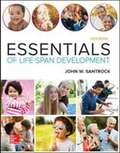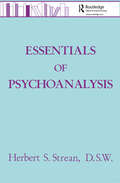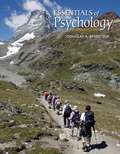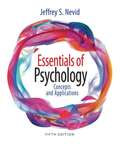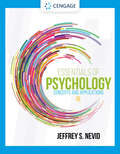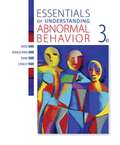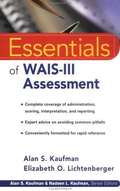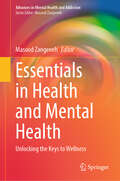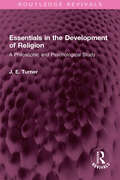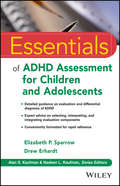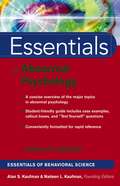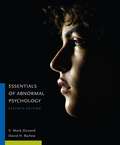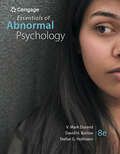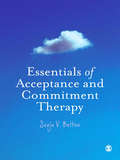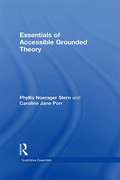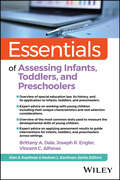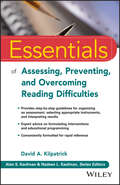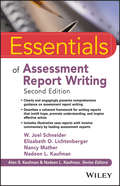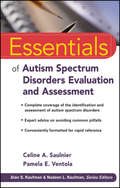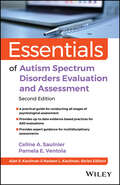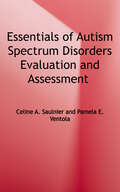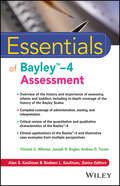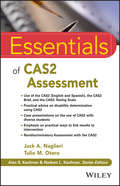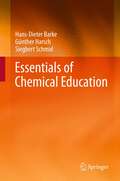- Table View
- List View
Essentials Of Life-Span Development
by John SantrockAs a master teacher, John Santrock connects students to current research and real-world application, helping students see how developmental psychology plays a role in their own lives and future careers. Through an integrated, personalized digital learning program, students gain the insight they need to study smarter and improve performance.
Essentials Of Psychoanalysis
by Herbert S. StreanFirst published in 1995. Routledge is an imprint of Taylor & Francis, an informa company.
Essentials Of Psychology
by Douglas A. BernsteinConcise, readable, and packed with the latest research about one of the most fascinating and relevant subjects you'll ever study, ESSENTIALS OF PSYCHOLOGY, 7th Edition, encourages you to learn by doing -- to actively participate and to think about what you're learning as opposed to passively receiving written information. Effective learning features help you master the material and make your study time count. You'll also see how topics in psychology are interrelated, and ramp up your critical thinking skills, including practicing a surefire questioning process for thinking objectively about research questions and results.
Essentials Of Psychology: Concepts And Applications
by Jeffrey NevidWelcome to the Fifth Edition of Essentials of Psychology: Concepts and Applications. I set out to accomplish three ma¬jor purposes in writing this text: <br>1. To make the study of psychology accessible and engaging to beginning students in psychology <br>2. To provide students with a solid grounding in the knowl¬edge base in psychology <br>3. To help students succeed in the course
Essentials Of Psychology: Concepts And Applications
by Jeffrey S. NevidESSENTIALS OF PSYCHOLOGY: CONCEPTS AND APPLICATIONS, 6th Edition, makes the study of psychology come alive while providing solid grounding in key knowledge to help you succeed in the course. An effective learning system helps you absorb and remember important information, while numerous hands-on activities enable you to apply what you learn. This edition also includes an expanded focus on psychology in the digital world. The text is available with MindTap, a digital learning experience featuring an e-book, videos, interactive study tools and more.
Essentials Of Understanding Abnormal Behavior
by Derald Wing Sue David Sue Diane M. SueFeaturing current research, high-quality scholarship, and an appealing design, UNDERSTANDING ABNORMAL BEHAVIOR, 11th Edition, is a balanced, clear introduction to abnormal psychology. Fully updated to reflect the new DSM-5, the new edition features the Multipath Model of Mental Disorders, which visually and conceptually explains how mental illnesses are caused. Throughout the book, a focus on resilience highlights prevention and recovery from the symptoms of various disorders. This edition also continues its emphasis on the multicultural, sociocultural and diversity aspects of abnormal psychology. The authors present material in a lively and engaging manner, connecting topics to real-world case studies, current events, and issues of particular importance and relevance to today's college students. Overall, the book presents an evenhanded treatment of abnormal psychology as both a scientific and a clinical endeavor.
Essentials Of Wais-III Assessment (AMS Series)
by Alan S. Kaufman Elizabeth O. LichtenbergerComplete coverage of administration, scoring, interpretation, and reporting. <P><P> Expert advice on avoiding common pitfalls. <P><P> Conveniently formatted for rapid reference. <P><P> Quickly acquire the knowledge and skills you need to confidently administer, score, and interpret the WAIS-III. <P><P> The latest version of the Wechsler Adult Intelligence Scale, WAIS-III, which includes several significant modifications and structural changes, three new subsets, and a variety of optional procedures, is a more sophisticated and complex instrument than its predecessors. Professionals who wish to use it properly need an authoritative source of advice and guidance on how to properly administer, score, and interpret the updated test. Coauthored by Alan S. Kaufman, who worked closely with David Wechsler on the WISC-R, Essentials of WAIS-III Assessment is that source. <P><P> Like all the volumes in the new Essentials of Psychological Assessment series, this book is designed to help busy mental health practitioners quickly acquire the knowledge and skills they need to make optimal use of a major psychological assessment instrument. Each concise chapter features numerous callout boxes highlighting key concepts, bulleted points, and extensive illustrative material, as well as test questions that help you to gauge and reinforce your grasp of the information covered. <P><P> The initial chapters of Essentials of WAIS-III Assessment provide step-by-step guidance on test administration, scoring, and interpretation. In the chapters following, the authors provide their expert assessment of the test's relative strengths and weaknesses, valuable advice on its clinical applications, exciting new research data on aging and IQ, and several illuminating case reports.
Essentials for Child Development: Associates Working with Young Children (2nd edition)
by Carol Brunson DayThis book contains essential information about what competent teachers of young children do.
Essentials in Health and Mental Health: Unlocking the Keys to Wellness (Advances in Mental Health and Addiction)
by Masood ZangenehIn a world increasingly characterized by rapid change and constant challenges, maintaining good physical and mental health is more important than ever. "Essentials in Health & Mental Health" is a comprehensive exploration of the multifaceted landscape of health and well-being, delving into key aspects that affect individuals of all ages, backgrounds, and circumstances. Through the lens of 20 meticulously crafted chapters, this book takes you on a journey to understand the essential elements that contribute to our overall health, from the invisible struggles of loneliness and mental health problems to the impact of global events like the COVID-19 pandemic. The book begins with an eye-opening chapter that sheds light on the pervasive nature of loneliness and its profound impact on the functioning of individuals. The authors delve into the various costs of loneliness and uncover the under-recognized association between loneliness and mental health problems. In a world interconnected like never before, these insights are essential for anyone seeking to understand the complexities of human well-being.
Essentials in the Development of Religion: A Philosophic and Psychological Study (Routledge Revivals)
by J. E. TurnerFirst published in 1934, Essentials in the Development of Religion was written with the conviction that the psychological and philosophical analysis of all phases of religious experience, even those which may be accounted the highest, is capable of yielding results of inestimable importance which could be attained in no other way. Dr. Turner discusses the historical development of the philosophy of religion and reveals topics that have been presupposed or embodied in regular human life. The book will be of interest to students of philosophy, religion and psychology.
Essentials of ADHD Assessment for Children and Adolescents (Essentials of Psychological Assessment #97)
by Elizabeth P. Sparrow Drew ErhardtA comprehensive approach to accurate ADHD diagnosis In Essentials of ADHD Assessment in Children and Adolescents, the authors provide a clear and informative road map for practitioners seeking to conduct state-of-the-art assessments for one of the most common disorders of childhood. Drawing upon years of experience in conducting diagnostic evaluations of ADHD following best-practice standards, they emphasize the importance of a comprehensive evaluation, incorporating data from multiple sources, using multiple methods, and interpreting findings within the appropriate developmental and cultural contexts. The major components of an ADHD evaluation (interviews, rating scales, cognitive testing, observation, record review) are reviewed in detail. Expert guidance is provided for resolving the most common challenges in assessing ADHD, including differentiating symptoms from normal development, dealing with discrepant data, differential diagnosis, and considering comorbidity. The latest scholarly literature is integrated with the authors' practical recommendations to provide clinicians with the concepts and tools needed for effective and accurate assessment of ADHD, addressing such topics as: When inattention is ADHD, and when it may be emotional or neurological Which disorders may masquerade as or present with ADHD The elements of accurate ADHD testing and the reasons behind them Integrating results of a multi-modal approach into an ADHD assessment An indispensable professional resource for practicing clinicians, Essentials of ADHD Assessment for Children and Adolescents is a reader-friendly guide to providing a thorough, responsible ADHD evaluation.
Essentials of Abnormal Psychology
by Getzfeld Andrew R.Essentials of Abnormal Psychology provides students and professionals with a concise overview of the major topics in abnormal psychology as well as chapters on the leading categories of disorders such as eating disorders, schizophrenic disorders, personality disorders, and substance-related disorders. This book utilizes the popular Essentials format and makes a perfect companion to primary texts on the topic or a useful study guide. As part of the Essentials of Behavioral Science series, this book provides information mental health professionals need to practice knowledgably, efficiently, and ethically in today's behavioral healthcare environment. Each concise chapter features numerous callout boxes highlighting key concepts, bulleted points, and extensive illustrative material, as well as "Test Yourself" questions that help you gauge and reinforce your grasp of the information covered. Condensing the wide-ranging topics of the field into a concise, accessible format for handy and quick-reference, Essentials of Abnormal Psychology is an invaluable tool for learning as well as a convenient reference for established mental health professionals Other titles in the Essentials of Behavioral Science series: Essentials of Child Psychopathology Essentials of Statistics for the Social and Behavioral Sciences Essentials of Psychological Testing Essentials of Research Design and Methodology
Essentials of Abnormal Psychology
by David H. Barlow V. Mark DurandThe authors explain abnormal psychology through their standard-setting integrative approach. Students learn that psychological disorders are rarely caused by a single influence, but rooted in the interaction among multiple factors - biological, psychological, cultural, social, familial and even political.
Essentials of Abnormal Psychology (Mindtap Course List)
by David H. Barlow Stefan G. Hofmann V. Mark DurandFully integrating the DSM-5, this brief version of Durand, Barlow, and Hofmann's widely used ABNORMAL PSYCHOLOGY presents the subject through the authors' standard-setting integrative approach -- the most modern, scientifically valid method for studying psychopathology. Students learn that psychological disorders are rarely caused by a single influence, but rooted in the interaction among biological, psychological, cultural, social, familial, and even political factors. Real case profiles -- 95 percent from the authors' own case files -- provide a realistic context for the scientific discussions. They also help to ensure that readers never lose sight of the fact that real people are behind the DSM-5 criteria, the theories, and the research. Also available: the MindTap digital learning solution.
Essentials of Acceptance and Commitment Therapy
by Sonja V. Batten′The literature on Acceptance and Commitment Therapy (ACT) is vast but if you want to dig down to the essentials of ACT you′ve found the right volume. Nothing central is left out and nothing unnecessary is left in. Written by one of the world′s experts on ACT, this book delivers. Highly recommended.′ - Dr Steven C. Hayes, Foundation Professor, University of Nevada This practical, easy-to-use book introduces the theory and practice of Acceptance and Commitment Therapy (ACT), a key contextual third wave CBT approach. The book takes the reader through the therapeutic stages from start to end, showing how to use acceptance and mindfulness together with commitment and behaviour change strategies to improve mental health. This is a uniquely concise and clear introduction that does not require prior knowledge of the approach. It " puts the emphasis on practical interventions and direct applicability in real practice " avoids jargon and complex language " is full of case examples to translate the theory into practice " includes key points and questions to test readers′ comprehension of the topics covered. After reading this book, readers will be able to apply basic ACT interventions for common problems, and will know if they are interested in more in-depth training in ACT. This is a must-have overview of ACT for CBT trainees on graduate level courses in the UK and worldwide. It will also be of value to practitioners on ACT workshops and short courses, as preliminary or follow-up reading.
Essentials of Accessible Grounded Theory (Qualitative Essentials #4)
by Phyllis Noerager Stern Caroline Jane PorrPhyllis Noerager Stern and Caroline Porr provide the most accessible description of grounded theory methods to date in this brief, clear, and useful guide. Based on the foundational work of Barney Glaser, the volume reflects the complexity of conducting grounded theory research-- not something that can be done “by the numbers”-- while offering much-needed help to younger scholars and community-based researchers in using the method effectively in practice. Examples, exercises, references and a glossary provide important resources for the grounded-theory novice.
Essentials of Assessing Infants, Toddlers, and Preschoolers (Essentials of Psychological Assessment)
by Vincent C. Alfonso Joseph R. Engler Brittany A. DaleA practitioner-oriented guide to the most important assessments and evaluation techniques for children ages 0-5 Many assessment professionals leave their graduate education programs without any formal training in assessing infants and young children. Although there are assessment textbooks covering subsets of this age range, Essentials of Assessing Infants, Toddlers, and Pre-Schoolers is uniquely designed for busy practitioners, and it covers the full range of assessments for 0-5 years old. With medical advances and new treatments, there is a higher prevalence of children with complex medical and psychological needs. Additionally, changing educational policies often affect assessment practices. Assessment professionals must have current information to effectively assess young children and assist in planning interventions. As with all volumes in the Essentials of Psychological Assessment series, this book consists of concise chapters featuring callout boxes highlighting key concepts, easy-to-learn bullet points, and extensive illustrative material, as well as test questions that help you gauge and reinforce your grasp of the information covered. Understand the issues unique to assessing children aged 0-5 years Get expert advice on assessing children with extremely early preterm birth, genetic conditions, and other unique situations Consider the future directions in the assessment of infants, toddlers, and preschoolers Quickly and easily locate pertinent information and access resources and tools to aid in performing professional duties This straightforward manual includes thorough coverage on how assessment results guide effective interventions. Essentials of Assessing Infants, Toddlers, and Pre-Schoolers is a valuable addition to the libraries of developmental practitioners, school and clinical psychologists, pediatricians, speech-language pathologists, and others responsible for the assessment of very young children.
Essentials of Assessing, Preventing, and Overcoming Reading Difficulties (Essentials of Psychological Assessment)
by David A. KilpatrickPractical, effective, evidence-based reading interventions that change students' lives Essentials of Understanding and Assessing Reading Difficulties is a practical, accessible, in-depth guide to reading assessment and intervention. It provides a detailed discussion of the nature and causes of reading difficulties, which will help develop the knowledge and confidence needed to accurately assess why a student is struggling. Readers will learn a framework for organizing testing results from current assessment batteries such as the WJ-IV, KTEA-3, and CTOPP-2. Case studies illustrate each of the concepts covered. A thorough discussion is provided on the assessment of phonics skills, phonological awareness, word recognition, reading fluency, and reading comprehension. Formatted for easy reading as well as quick reference, the text includes bullet points, icons, callout boxes, and other design elements to call attention to important information. Although a substantial amount of research has shown that most reading difficulties can be prevented or corrected, standard reading remediation efforts have proven largely ineffective. School psychologists are routinely called upon to evaluate students with reading difficulties and to make recommendations to address such difficulties. This book provides an overview of the best assessment and intervention techniques, backed by the most current research findings. Bridge the gap between research and practice Accurately assess the reason(s) why a student struggles in reading Improve reading skills using the most highly effective evidence-based techniques Reading may well be the most important thing students are taught during their school careers. It is a skill they will use every day of their lives; one that will dictate, in part, later life success. Struggling students need help now, and Essentials of Understanding and Assessing Reading Difficulties shows how to get these students on track.
Essentials of Assessment Report Writing (Essentials of Psychological Assessment #22)
by Nancy Mather Elizabeth O. Lichtenberger Nadeen L. Kaufman W. Joel SchneiderThe bestselling guide to reporting writing, updated and reworked for today's practice Essentials of Assessment Report Writing offers effective solutions to the creation of reader-friendly, yet targeted, psychological, and educational assessment reports. Parents, clinicians, clients, and other readers need more than test-by-test descriptions—they need an accessible analysis of the entire situation to determine their next steps. This book provides clear guidance for busy practitioners seeking ways to improve their report writing skills. With a focus on current practice, this new second edition covers DSM-5 updates and the latest assessment instruments including the WJ IV, WISC-V, WAIS-IV, KTEA-3, and the CAS2. New discussion includes advice on tailoring the report to the audience, and annotated case reports provide illustrative models of effective report styles, interpretation, and analysis. Key concepts are highlighted for quick reference throughout, and end-of-chapter questions help reinforce understanding. Reporting styles vary widely within the field, in both content and style; there is no definitive "standard," but many reports fail to reflect best practices and therefore prove less than useful to the reader. This book provides expert guidance throughout the reporting process to help practitioners provide high-quality, accessible reports. Integrate assessment results to provide a person-centered report Identify and navigate critical decision points in the interpretive process Write efficiently yet effectively while enhancing the reader's experience Provide an accurate, informative, and readable assessment report Incorporate practical recommendations to address the referral concerns Expertly-conducted assessments should culminate with a carefully constructed analysis that provides direction via clear communication. Because this report will be used to inform treatment, intervention, and ultimately, the client's quality of life—it is critical that it provides clear, informative guidance in a way that readers can understand. Essentials of Assessment Report Writing provides comprehensive guidelines for navigating through the report writing process.
Essentials of Autism Spectrum Disorders Evaluation and Assessment
by Celine A. Saulnier Pamela E. VentolaQuickly acquire the knowledge and skills you need to utilize the varied assessments frequently used in evaluating autism spectrum disorders With both the detection and awareness of autism spectrum disorders (ASD) on the rise, there is an urgent need for an increasing number of professionals to not only learn about the nature and course of the various autism spectrum disorders, but also to know how to identify, assess, and diagnose the presence of these disorders. Essentials of Autism Spectrum Disorders Evaluation and Assessment addresses the main domains of assessment, defines the purpose of the assessment, suggests test instruments, and discusses the unique clinical applications of each instrument to the diagnosis of ASD. Like all the volumes in the Essentials of Psychological Assessment series, each concise chapter features numerous callout boxes highlighting key concepts, bulleted points, and extensive illustrative material, as well as test questions that help you gauge and reinforce your grasp of the information covered. Providing an in-depth look at ASD evaluation and assessment, this straightforward book includes samples of integrated reports from comprehensive model diagnostic evaluations and prepares clinical and school psychologists, as well as speech and language pathologists, to effectively evaluate and assess ASD. Complete coverage of the identification andassessment of autism spectrum disorders Expert advice on avoiding common pitfalls Conveniently formatted for rapid reference Other titles in the Essentials of Psychological Assessment series: Essentials of Dyslexia Assessment and Intervention Essentials of Assessment Report Writing Essentials of School Neuropsychological Assessment Essentials of Evidence-Based Academic Interventions Essentials of Specific Learning Disability Identification Essentials of Processing Assessment Essentials of Executive Function Assessment Essentials of Cross-Battery Assessment, Second Edition
Essentials of Autism Spectrum Disorders Evaluation and Assessment (Essentials of Psychological Assessment #83)
by Celine A. Saulnier Pamela E. VentolaGain an understanding of the most important autism spectrum assessments and evaluation techniques Essentials of Autism Spectrum Disorders Evaluation and Assessment, 2nd Edition, helps professionals learn how to identify, assess, and diagnose autism spectrum disorders (ASD). In a time when detection and awareness of ASD are on the rise, this book addresses the primary domains of assessment, discusses the purpose of assessment, suggests test instruments, and identifies the unique clinical applications of each instrument to the diagnosis of ASD. As with all volumes in the Essentials of Psychological Assessment series, this book consists of concise chapters featuring callout boxes highlighting key concepts, easy-to-learn bullet points, and extensive illustrative material, as well as test questions that help you gauge and reinforce your grasp of the information covered. Understand the issues in identification and assessment of autism spectrum disorders Get expert advice on avoiding common pitfalls and misinterpretations Quickly and easily locate pertinent information, thanks to the convenient, rapid-reference format Access resources and tools to aid in performing professional duties. This straightforward manual includes samples of integrated reports from diagnostic evaluations and prepares clinical and school psychologists, and clinicians from allied disciplines, to effectively evaluate and assess ASD.
Essentials of Autism Spectrum Disorders Evaluation and Assessment (Essentials of Psychological Assessment Ser.)
by Celine A. Saulnier Pamela E. VentolaQuickly acquire the knowledge and skills you need to utilize the varied assessments frequently used in evaluating autism spectrum disorders With both the detection and awareness of autism spectrum disorders (ASD) on the rise, there is an urgent need for an increasing number of professionals to not only learn about the nature and course of the various autism spectrum disorders, but also to know how to identify, assess, and diagnose the presence of these disorders. Essentials of Autism Spectrum Disorders Evaluation and Assessment addresses the main domains of assessment, defines the purpose of the assessment, suggests test instruments, and discusses the unique clinical applications of each instrument to the diagnosis of ASD. Like all the volumes in the Essentials of Psychological Assessment series, each concise chapter features numerous callout boxes highlighting key concepts, bulleted points, and extensive illustrative material, as well as test questions that help you gauge and reinforce your grasp of the information covered. Providing an in-depth look at ASD evaluation and assessment, this straightforward book includes samples of integrated reports from comprehensive model diagnostic evaluations and prepares clinical and school psychologists, as well as speech and language pathologists, to effectively evaluate and assess ASD. - Complete coverage of the identification andassessment of autism spectrum disorders -Expert advice on avoiding common pitfalls -Conveniently formatted for rapid reference -Other titles in the Essentials of Psychological Assessment series: -Essentials of Dyslexia Assessment and Intervention -Essentials of Assessment Report Writing -Essentials of School Neuropsychological Assessment -Essentials of Evidence-Based Academic Interventions -Essentials of Specific Learning Disability Identification -Essentials of Processing Assessment -Essentials of Executive Function Assessment -Essentials of Cross-Battery Assessment, Second Edition
Essentials of Bayley-4 Assessment (Essentials of Psychological Assessment)
by Vincent C. Alfonso Joseph R. Engler Andrea D. TurnerAdminister and apply the Bayley-4 Scales of Infant and Toddler Development with confidence In Essentials of Bayley 4 Assessment, a distinguished team of authors delivers state-of-the-art guidelines for the application of the new Bayley 4 test of infant and toddler development. The resource offers a comprehensive guide to administering, scoring, interpreting, and applying the test. The resource provides key updates made since the publication of the previous version of the test, such as: Updated administration and scoring guideance, content updates, new norms and clinical studies, and shortened administration time Instruction on a Digital Delivery Option of the Bayley 4 (i.e., Q-interactive) New illustrative case studies and examples of Bayley 4 reports. Written for developmental practitioners, school and clinical psychologists, pediatricians, pediatric neuropsychologists, speech-language pathologists, occupational therapists, and physical therapists, Essentials of Bayley 4 is also an indispensable resource for university professors and students in training in assessment related fields.
Essentials of CAS2 Assessment (Essentials of Psychological Assessment)
by Jack A. Naglieri Tulio M. OteroThe definitive guide to the latest edition of the Cognitive Assessment System Essentials of CAS2 Assessment is a comprehensive guide to the successful administration of the updated CAS2. Written by leading cognitive assessment experts, the book discusses the latest research and thinking on PASS (Planning, Attention-Arousal, Simultaneous and Successive) theory and includes case studies that demonstrate the use of CAS2 with several types of diagnostic groups and integration with other instruments. A companion website offers additional tools and information to help busy professionals make optimal use of the CAS2. This is the first book to provide comprehensive, step-by-step guidelines for administering, scoring, and interpreting the latest edition of the Cognitive Assessment System (CAS2). While the outcome of the test depends upon the child's performance, the reliability and accuracy of the analysis depends largely upon the performance of the test administrator. Essentials of CAS2 Assessment offers detailed insight on topics such as: Fair assessment of diverse populations Assessment of children with comorbid conditions Changes to the CAS2 rating scale and form Nuances of the three-tier model Each chapter in the book highlights key concepts, bulleted points, and actual test questions. The CAS2 is a valuable tool in the detection of learning disabilities, ADHD, TBI, retardation, and giftedness. Essentials of CAS2 Assessment is the guidebook professionals need to ensure the CAS2 test is applied and analyzed accurately so that the results can be applied to the maximum benefit of the child.
Essentials of Chemical Education
by Siegbert Schmid Günther Harsch Hannah Gerdau Hans-Dieter BarkeFor everybody teaching chemistry or becoming a chemistry teacher, the authors provide a practice-oriented overview with numerous examples from current chemical education, including experiments, models and exercises as well as relevant results from research on learning and teaching. With their proven concept, the authors cover classical topics of chemical education as well as modern topics such as every-day-life chemistry, student's misconceptions, the use of media or the challenges of motivation. This is the completely revised and updated English edition of a highly successful German title.
